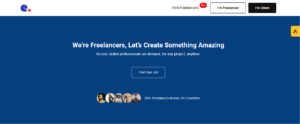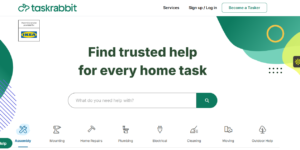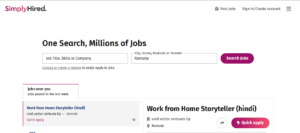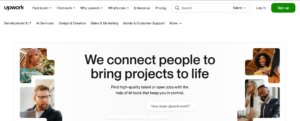The UK freelance economy is thriving, with professionals in tech, marketing, design, and beyond embracing contract work for its flexibility and autonomy. Whether you’re targeting UK-based clients or seeking platforms that align with local business culture, choosing the right freelancing website is crucial for career growth.
Here’s a curated list of the best platforms for UK freelancers, designed to connect you with high-value opportunities in 2025.

Flexable
Flexable is gaining traction in the UK, boasting over 19,800 freelancers and 1,500 partnered agencies. More than a job board, it’s a community prioritizing quality, blending solo talent with agency collaboration. For UK freelancers in marketing or tech, its curated onboarding and focus on scalable projects make it a standout.
Why It’s Great:
-
Rapid growth in the UK freelance market
-
Combines solo and agency projects
-
Streamlined process ensures quality clients
The Downsides:
-
Global recognition still growing
-
Limited niche role diversity
-
Smaller client base for specialized skills

Flexibility.co.uk
Flexibility.co.uk is a UK-focused job board championing flexible, remote, and freelance roles. With listings in admin, IT, education, and customer service, it’s ideal for freelancers seeking remote UK gigs that prioritize work-life balance. Its user-friendly filters make finding local opportunities straightforward.
Why It’s Great:
-
Tailored for UK flexible work
-
Regularly updated freelance listings
-
Easy filtering by location and category
The Downsides:
-
Fewer creative or tech-specific roles
-
No in-platform project tools
-
Limited visibility outside the UK

Reed.co.uk
Flexibility.co.uk is a UK-focused job board championing flexible, remote, and freelance roles. With listings in admin, IT, education, and customer service, it’s ideal for freelancers seeking remote UK gigs that prioritize work-life balance. Its user-friendly filters make finding local opportunities straightforward.
Why It’s Great:
-
Tailored for UK flexible work
-
Regularly updated freelance listings
-
Easy filtering by location and category
The Downsides:
-
Fewer creative or tech-specific roles
-
No in-platform project tools
-
Limited visibility outside the UK

YunoJuno
YunoJuno is a UK-born platform for digital freelancers, including developers, designers, UX/UI experts, and marketers. It offers vetted listings, in-platform contracts, timesheets, and payments, making it a favorite for London-based startups and agencies seeking high-quality talent.
Why It’s Great:
-
Designed for UK digital freelancers
-
Comprehensive contract and payment tools
-
Trusted by major UK brands
The Downsides:
-
Requires application and approval
-
Primarily UK-focused opportunities
-
Geared toward mid- to senior-level pros

Malt UK
Malt, a European platform with a strong UK presence, connects tech and creative freelancers with businesses. Its transparent profiles let you showcase rates and skills, fostering direct client communication. With contracts and payments handled in-platform, it’s a seamless solution for UK freelancers.
Why It’s Great:
-
Transparent profiles and pricing
-
Direct client collaboration
-
Growing UK client base
The Downsides:
-
Less known than UK-native platforms
-
Some listings lean EU-focused
-
High competition in popular fields

Creativepool
Creativepool is a vibrant UK platform for creative freelancers in design, advertising, photography, and branding. Combining portfolio hosting with a job board, it helps freelancers in cities like London and Manchester get discovered by agencies and clients.
Why It’s Great:
-
Strong UK creative industry network
-
Portfolios boost visibility
-
Freelance and contract job listings
The Downsides:
-
Limited to creative roles
-
Premium features require payment
-
Minimal project management tools

Freelancer.co.uk
Freelancer.co.uk, the UK arm of Freelancer.com, connects freelancers with local and global projects in IT, design, marketing, and more. Its bidding system is competitive, but a strong pitch and reviews can secure steady UK-based work.
Why It’s Great:
-
Tailored for UK freelancers
-
Access to local and international gigs
-
Broad industry coverage
The Downsides:
-
High competition for roles
-
Service fees reduce earnings
-
Project quality varies

TaskRabbit UK
TaskRabbit UK connects freelancers with local clients in cities like London, Manchester, and Birmingham for in-person tasks like deliveries, repairs, and cleaning. It’s ideal for freelancers offering physical services and seeking flexible, local work.
Why It’s Great:
-
Perfect for local UK gigs
-
Flexible rates and schedules
-
High demand in urban areas
The Downsides:
-
Not suited for remote work
-
Service fees apply
-
Work volume varies by region

Simply Hired UK
Simply Hired UK aggregates freelance, part-time, and remote roles across the UK. Freelancers can filter by industry or location, making it easy to find opportunities without juggling multiple platforms, though job quality can be inconsistent.
Why It’s Great:
-
Pulls listings from UK sources
-
Covers diverse industries
-
No signup needed to browse
The Downsides:
-
Lacks platform-specific tools
-
External application process
-
Variable job quality

Indeed UK
ndeed UK’s vast database includes freelance and contract roles in marketing, IT, finance, and creative services. Its robust filters help freelancers find UK-specific remote gigs, though competition is fierce and careful filtering is needed.
Why It’s Great:
-
Huge UK job listing pool
-
Easy application process
-
Strong employer recognition
The Downsides:
-
High competition for listings
-
Not freelancer-exclusive
-
Broad “contract” labeling can mislead

Upwork
Upwork remains a titan in 2025, offering UK freelancers opportunities in marketing, tech, and writing. Serving startups and enterprises, it supports short-term gigs and long-term contracts. AI-powered job matching enhances discoverability for UK-based pros.
Why It’s Great:
-
Diverse project categories
-
Trusted by global and UK clients
-
Flexible project durations
The Downsides:
-
Tough competition for beginners
-
Fees range from 10% to 20%
-
Algorithm drives visibility

Fiverr
Fiverr’s fixed-price model excels for UK freelancers in marketing, design, and content creation. Its intuitive platform lets you craft tailored service packages, while Fiverr Neo’s AI recommendations boost client connections.
Why It’s Great:
-
Ideal for niche, productized services
-
Quick setup for selling
-
Fiverr Neo improves matching
The Downsides:
-
Price competition lowers value
-
Limited gig customization
-
Ratings impact visibility

Freelancer.com
Freelancer.com’s massive marketplace lets US freelancers bid on projects or compete in contests across marketing, tech, and creative fields. Its scale offers reach, but competition is fierce. With a polished pitch and strong reviews, it’s a solid choice for those comfortable hustling for gigs.
Why It’s Great:
-
Huge global and US client base
-
Options for bids or contests
-
Covers diverse industries
The Downsides:
-
Bidding can lower earnings
-
Free plan limits visibility
-
Some jobs are vague or low-budget

Toptal
Toptal’s selective vetting accepts only the top 3% of applicants, connecting UK freelancers in tech, marketing, and design with high-budget projects. It’s ideal for seasoned pros targeting top-tier UK and global clients.
Why It’s Great:
-
Elite clients with big budgets
-
High-value projects
-
Vetting enhances credibility
The Downsides:
-
Highly selective entry
-
Limited to tech, marketing, design
-
Not for beginners

Guru.com
Guru offers UK freelancers flexibility in marketing, tech, and writing projects. Its SafePay and workroom tools ensure smooth collaboration, and lower fees make it appealing. Its simplicity suits those seeking steady UK gigs.
Why It’s Great:
-
Flexible payment options
-
User-friendly project tools
-
Competitive fees
The Downsides:
-
Smaller project volume
-
Dated interface
-
Limited freelancer marketing

PeoplePerHour
UK-based PeoplePerHour excels in marketing, design, and web development, offering gig-style and proposal-based projects. Its transparent ratings and regular updates make it a top choice for UK freelancers seeking local opportunities.
Why It’s Great:
-
Strong for UK marketing and design
-
Flexible project options
-
Transparent ranking system
The Downsides:
-
Slower support responses
-
Budget-conscious clients
-
Limited non-English market reach

inkedIn’s Services Marketplace lets UK freelancers showcase services on their profiles, while its job board lists freelance roles. Its strength lies in organic discovery through content and connections, ideal for active networkers.
Why It’s Great:
-
Professional credibility built-in
-
Networking drives leads
-
Robust job board integration
The Downsides:
-
Few freelance tools
-
Manual project tracking
-
Marketplace less mature in some fields

Final Takeaway
The UK freelance scene in 2025 is dynamic, with platforms catering to every niche, from Manchester marketers to Glasgow developers. Whether you’re chasing remote tech gigs, local tasks, or creative projects, these websites connect you with clients who value quality.
Pick a platform that aligns with your skills, market, and ambitions to build a freelance career that’s both flexible and rewarding.
